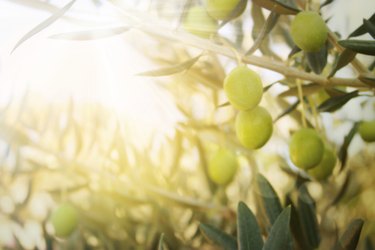
Viruses -- microscopic infective agents consisting of protein-encased genetic materials -- are responsible for a vast repertory of diseases, from Ebola and AIDS to influenza and the common cold. Viruses multiply by hijacking the host cell's machinery to create more viruses; antiviral remedies disrupt this process and can help viruses run their course more quickly. Herbalists have long recommended olive leaves -- powerfully resistant to invasion by microbes and insects -- as a natural antiviral. While clinical studies are lacking, laboratory research supports olive leaf extract's antiviral properties. Consult your doctor before using olive leaf extract.
Features
Video of the Day
The olive tree, botanically known as Olea europaea, is a small evergreen tree native to the Mediterranean area. The tree features leathery, grayish-green leaves and produces small, bluish-black fruits that are high in beneficial monounsaturated fat. Olive leaves have been used in herbal medicine for thousands of years. As early as 3500 B.C., the leaves were used to clean wounds, promote healing and avoid infection; they were also used in poultices to treat dermatitis, boils, abscesses and skin ulcers. In addition, olive leaves were taken internally for fevers and systemic infections. Olive leaf extract was employed against malaria in the 19th century. Present-day herbalists advise olive leaf extract to boost the immune system, help prevent disease, and lower cholesterol and high blood pressure. An olive leaf extract has been patented in the United States as an antiviral against a number of diseases, including herpes, mononucleosis and hepatitis.
Video of the Day
Constituents and Effects
Olive leaves contain an iridoid called oleuropein, the pharmacologically active constituent responsible for most of the leaves' therapeutic effects. Triterpenes and flavonoids -- including rutin, apigenin, luteolin and dismetin -- are also present in olive leaves, as are the compounds oleasterol, leine and glycoside oleoside. Drugs.com credits olive leaf extracts with inhibiting the replication and the cell-to-cell transmission of HIV in test tube studies. The website also attributes antioxidant properties to olive leaf extract. Theherbprof.com reports that oleuropein inhibits viruses by preventing virus shedding, budding and assembly at the cell membrane, as well as stimulating an immune process in which cells ingest pathogenic microorganisms. Blue Shield Complementary and Alternative Health concurs that oleuropein directly attacks microbes.
Research
In a laboratory and animal study published in 2009 in "Journal of Ethnopharmacology," researchers found that oleuropein -- obtained in this study from a variety of jasmine, and also a constituent of olive leaf -- was active against the hepatitis B virus both in test tubes and in live ducks. They noted that oleuropein effectively blocked the secretion of hepatitis B surface antigen in cells, while reducing the presence of virus in the blood of ducks infected with hepatitis B. The team called for further study of oleuropein as a potential therapeutic agent against hepatitis B virus.
Dosage
Olive leaf extract is available in 500- and 750-mg capsules, containing 20 mg of oleuropein per capsule. Although Drugs.com reports that there is no standard dosage, "Handbook of Medicinal Herbs" by James A. Duke advises 500 mg four times a day for short term use. BSCAH advises making a tea by steeping 1 tsp of dried leaves in a cup of hot water for 10 to 15 minutes, then straining; you may drink three cups a day. Take olive leaf extracts or tea with food to avoid stomach irritation. Olive leaf extracts can interact with prescription medications, and may increase the effects of blood thinners. Consult your doctor before using olive leaf extracts. Don't use olive leaf extracts if you are pregnant or breast feeding.